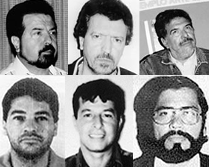
The Cali Cartel was a drug cartel based in southern Colombia, around the city of Cali and the Valle del Cauca. Its founders were the brothers Gilberto Rodríguez Orejuela, Miguel Rodríguez Orejuela and José Santacruz Londoño. They broke away from Pablo Escobar and his Medellín associates in 1988, when Hélmer "Pacho" Herrera joined what became a four-man executive board that ran the cartel.
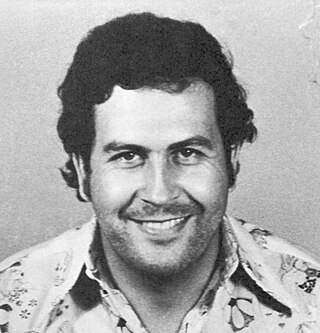
The Medellín Cartel was a powerful and highly organized Colombian drug cartel and terrorist organization originating in the city of Medellín, Colombia, that was founded and led by Pablo Escobar. It is often considered to be the first major "drug cartel" and was referred to as such due to the organization's upper echelons and overall power-structure being built on a partnership between multiple Colombian traffickers operating alongside Escobar. Other members included Jorge Luis Ochoa Vásquez, Fabio Ochoa Vásquez, Juan David Ochoa Vásquez, José Gonzalo Rodríguez Gacha, and Carlos Lehder. Escobar's main partner in the organization was his cousin Gustavo Gaviria, who handled much of the cartel's shipping arrangements and the more general and detailed logistical aspects of the cocaine trafficking routes and international smuggling networks, which were supplying at least 80% of the world's cocaine during its peak.

Carlos Enrique Lehder Rivas is a Colombian and German former drug lord who was co-founder of the Medellín Cartel. Born to a German father and Colombian mother, he was the first high-level drug trafficker extradited to the United States, after which he was released from prison in the United States after 33 years in 2020. Originally from Armenia, Colombia, Lehder eventually ran a cocaine transport empire on Norman's Cay island, 210 miles (340 km) off the Florida coast in the central Bahamas.
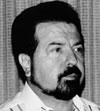
Gilberto José Rodríguez Orejuela was a Colombian drug lord and one of the leaders of the Cali Cartel. Orejuela formed the cartel with his brother, Miguel Rodríguez Orejuela, José Santacruz Londoño, and Hélmer Herrera. The cartel emerged to prominence in the early 1990s, and was estimated to control about 80% of the American and 90% of the European cocaine markets in the mid-1990s. Rodríguez Orejuela was captured after a 1995 police campaign by Colombian authorities and sentenced to 15 years in prison. He obtained early release in 2002, and was re-arrested in 2003, after which he was extradited to the United States. There, he was sentenced to 30 years in prison, where he died in 2022.
The Norte del Valle Cartel, or North Valley Cartel, was a drug cartel that operated principally in the north of the Valle del Cauca department of Colombia, most notably the coastal city of Buenaventura. It rose to prominence during the 1990s, after the Cali and Medellín Cartels fragmented, and it was known as one of the most powerful organizations in the illegal drug trade. The drug cartel was led by the brothers Luis Enrique and Javier Antonio Calle Serna, alias "Los Comba", until its takedown in 2008 by the authorities of Colombia and Venezuela, with cooperation of the United States DEA.
Curtis Francis Warren is an English gangster and drugs trafficker who was formerly Interpol's Target One and was once listed on The Sunday Times Rich List.
Juan Ramón Matta-Ballesteros is a Honduran former major narcotics trafficker who has been credited with being one of the first to connect Mexican drug traffickers with the Colombian cocaine cartels. This connection paved the way for a major increase in the amount of cocaine smuggled into the United States during the late 1970s and throughout the 1980s. Matta was indicted for operating several major cocaine smuggling rings in United States in the early 1980s. He was also one of the narcotics traffickers accused of the kidnap and murder of American DEA agent Enrique Camarena in 1985.
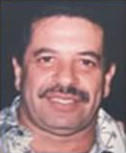
Carlos Alberto "Beto" Rentería Mantilla was a former Colombian narcotrafficker and crime boss, presumed leader of the Norte del Valle Cartel. Rentería was believed by the United States government to be holding a leadership position within the drug cartel, he had been labeled "one of Colombia's most powerful and sophisticated narcotics traffickers" by Adam Szubin, Director of the Office of Foreign Assets Control, United States Department of the Treasury. The Attorney General of Colombia and the Colombian National Police accuse Rentería of drug trafficking and money laundering.

Banged Up Abroad is a British documentary/docudrama television series created by Bart Layton that was produced for Channel 5 and that premiered in March 2006. Most episodes feature stories of people who have been arrested while travelling abroad, usually for trying to smuggle illegal drugs, although some episodes feature people who were either kidnapped or captured while they were either travelling or living in other countries. Some episodes have featured real-life stories that first became well known when they were made the subject of a film: films that have been 're-made' in this way include Midnight Express, Goodfellas, The Devil's Double, Argo, Mr Nice and, to a lesser extent, Casino. A few episodes have focused on undercover infiltrations of criminal syndicates by law enforcement agents or individuals recruited by them.

Juan García Abrego is a Mexican convicted drug lord and former leader of the Gulf Cartel, a criminal group based in the state of Tamaulipas, Mexico. He started in the cartel under the tutelage of his uncle Juan Nepomuceno Guerra.
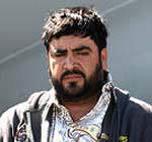
Alfredo Beltrán Leyva, commonly referred to by his alias El Mochomo, is a Mexican convicted drug lord and former leader of the Beltrán-Leyva Cartel, a drug trafficking organization. He was one of Mexico's most-wanted drug lords. Beltrán Leyva was responsible for smuggling multi-ton shipments of cocaine and methamphetamine to the United States from Mexico and South America between the 1990s and 2000s. He worked alongside his brothers Héctor, Carlos, and Arturo.
The illegal drug trade in Haiti involves trans-shipment of cocaine and marijuana to the United States. The island of Hispaniola, which Haiti shares with the Dominican Republic, is situated along a major shipping route for drug smuggling between Colombia and Puerto Rico. Because Puerto Rico is a Commonwealth of the United States, shipments are generally not subject to further U.S. Customs inspection after reaching the territory. Cocaine is also often smuggled directly to Miami in freighters.

Benjamín Arellano Félix is a Mexican former drug lord who alongside his brothers founded and led the Tijuana Cartel or "Arellano-Félix Organization” until his arrest in March 2002.
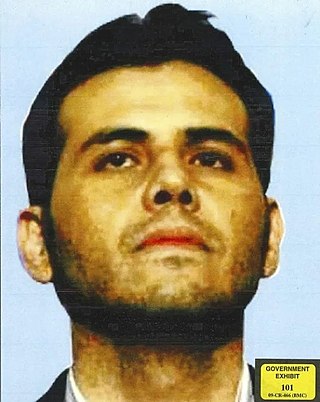
Jesús Vicente Zambada Niebla, also known as "El Vicentillo", is a Mexican convicted drug lord and former high-ranking member of the Sinaloa Cartel, a criminal group based in Sinaloa. He is the son of Ismael "El Mayo" Zambada, who was one of Mexico's most-wanted drug lords. He was arrested in Mexico City on 19 March 2009 and extradited to the United States in February 2010 to stand trial on narco-trafficking-related charges. He was sentenced to 15 years in prison on 30 May 2019. Due to his cooperation in testifying against several members of the Sinaloa Cartel, his conviction term was reduced.

Rafael Cárdenas Vela is a former Mexican drug lord and high-ranking lieutenant of the Gulf Cartel. He is the nephew of Antonio and Osiel Cárdenas Guillén, two men who at one time led the criminal organization.

Óscar Malherbe de León is a Mexican imprisoned drug lord and former high-ranking leader of the Gulf Cartel, a criminal group based in Tamaulipas. He was the main intermediary of the Gulf Cartel in Colombia, responsible for shipping large sums of cocaine from the Cali Cartel in the 1990s. Before becoming a drug trafficker, Malherbe worked as a shoeshiner and car washer. He then turned to the auto theft industry and was recruited in 1976 by Casimiro Espinosa Campos, a former leader of a cell within the Gulf Cartel. By age 22, the Mexican authorities had charged Malherbe with at least 10 homicides. In 1984, Espinosa was killed by Juan García Abrego, then-leader of the Gulf Cartel, who later appointed Malherbe as one of his top lieutenants and moneymen.
La Corporación, also known as the Santa Ana Cartel, was a Bolivian drug cartel and criminal organization, headed in the 1970s and 1980s by notorious drug lord Roberto Suárez Gómez, known as the "King of Cocaine".

Abigael González Valencia, commonly referred to by his alias El Cuini, is a Mexican suspected drug lord and former leader of the Jalisco New Generation Cartel (CJNG), a criminal group based in Jalisco. He was also the head of Los Cuinis, an organization allied to the CJNG. Along with his brother-in-law Nemesio Oseguera Cervantes, one of Mexico's most-wanted men, González Valencia reportedly coordinated international drug trafficking operations in the Americas, Europe, and Asia. He was also responsible for managing the financial operations of the CJNG and Los Cuinis.

Abel Briones Ruiz is a Mexican business owner and suspected drug trafficker for the Gulf Cartel, a criminal group based in Tamaulipas, Mexico. According to the U.S. District Court for the Southern District of Texas, between 2005 and 2014, Briones Ruiz and his network were responsible for cocaine trafficking from Mexico to the U.S., smuggling the cash proceeds back into Mexico, conducting money laundering from these earnings, and structuring financial activities to hide the illegal nature of his earnings. He did this through his family-run gasoline company, Combustibles Briones, S.A. de C.V. A fugitive from U.S. justice, Briones Ruiz faces up to life imprisonment and up to US$10 million in fines from his drug trafficking activities alone.
Maritime cocaine smuggling refers to the practice which involves the smuggling of cocaine between borders via maritime means. According to the United Nations Office on Drugs and Crime (UNODC), there are an estimated 18 million users of cocaine globally. Approximately 70–80% of cocaine is at some point smuggled across the ocean, originating from South America. Cocaine remains the "highest value criminal commodity for transnational organised crime", motivating the criminal organisations responsible for maritime smuggling practices. Maritime cocaine smuggling is therefore an ongoing international issue, as criminal organisations are finding new and innovative ways of smuggling cocaine and go undetected by authorities.













